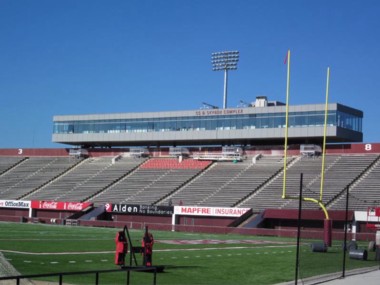Saturday, Sept. 27, the UMass football team returned to play a home game at McGuirk Stadium for the first time in three years, since making the jump to upper-division college football—a move that necessitated an upgrade to its on-campus facilities. All home games over the past two seasons, and the first two this year, have been played at New England Patriots owner Robert Kraft’s Gillette Stadium, nearly 100 miles away in Foxboro.
Maroon-clad fans cheering on their team likely noticed several aspects of the stadium’s estimated $34.5 million facelift. For example, located a few yards beyond the north end zone, the new 55,000-square-foot Performance Center includes locker rooms, rehabilitation services, and training facilities, as well as film rooms and offices for coaches. New turf replaces the old field, which was laid out in 2006. And a new press box with instant-replay capabilities rises over the stands to the west.
Astute observers may also have noticed that, oddly enough, neither the Performance Center nor the press box actually touch the existing stadium. The renovations were done this way, UMass spokesperson Edward Blaguszewski to the Advocate, to avoid having to comply with the American Disabilities Act of 1990 (ADA).

If the renovations don’t touch the existing structure, said Blaguszewski, “it doesn’t trigger the immediate need” to update the entire stadium, which was originally built in 1964.
He added that UMass “will have to look at and address” the need to comply with the ADA; he said the university intends to improve the stadium in phases, “over time.”
Blaguszewski said he is not aware of any immediate plans to bring McGuirk into ADA compliance.
The reason for not updating the stadium at the same time UMass upgrades locker room and media facilities, Blaguszewski said, comes down to “limited dollars.” Over the past 25 years, the percentage of university funds from the state has steadily gone down, with only a slight recent rebound, he said.
The tight budget demands “trade-offs,” he said, adding that it would cost “millions and millions of dollars” to make the entire stadium ADA compliant.
“This is not an atypical situation,” said Blaguszewski.
The Disability Law Center, a private, non-profit organization with offices in Boston and Northampton, advocates for the rights of Massachsuetts residents with disabilities. Executive Director Christine Griffin told the Advocate she was surprised that UMass chose to renovate parts of its sports complex wtihout doing all of the upgrades to be compliant with the ADA. University officials, she said, “are responsible for insuring that people have full access in their communities.”
Even if UMass can avoid ADA compliance by adding stadium renovations unattached to the already-standing structure, added Griffin, it should not do it that way. The school, she said, “should be looking at how to make it more accessible.”
UMass undertook its $34.5 million selective renovation of McGuirk as part of its effort to move its football program up in the college football hierarchy. An invitation to join the Mid-Atlantic Conference came with the provision that UMass upgrade its stadium. That’s when the university began planning to renovate. The football team joined the MAC two years ago, but will soon leave the conference: UMass ultimately declined to meet the MAC’s demand that UMass move all of its sports programs, not just football, into the MAC.
Even with its spiffy new press box and Performance Center, McGuirk will remain only a part-time home for UMass football. Assistant Athletic Director John Sinnet told the Advocate that for the foreseeable future, home games will continue to be split between Gillette and McGuirk.


